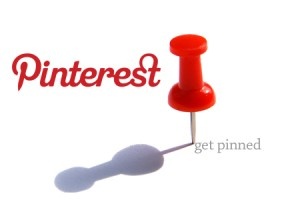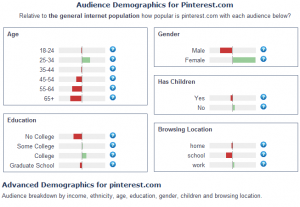Word of mouth has long been one of marketing’s strongest tools. The internet helped spur this along with the advent of blogs and, to a degree, user reviews located on e-commerce websites like Amazon. Now there is a new approach apparently taking the web by storm, digital scrapbooks! More to the point, pin boards, as they are called, created by users on a new social media website called Pinterest.
Pinterest has blasted onto the scene garnering over 10 million users between its March 2010 launch and January 2012(Crook, 2012). What’s even more impressive is that the site grew over 50% from January 2012 to February 2012 (Grove, 2012). This new medium was not intended to be a marketing tool but when you generate this much traffic, companies take notice. So how does Pinterest work exactly and how will it change marketing?
Essentially, users create a collage, or several, using images that capture their attention while surfing the web or by uploading their own. At this time, the majority of the site’s users are women, so , understandably, the majority of pin boards relate to topics of interest to women.
These collages are themed, with topics ranging from architecture and places to visit to weddings. The collages users create from web surfing are composed of images that track back to the original website; this is the key for marketers.
Let’s illustrate using the wedding pin board theme as an example. A woman planning her wedding can now, rather than leaf through mountains of wedding magazines, browse Pinterest for collages assembled by other users. Some of these users may be friends of hers who have already compiled favorite images of their own and whom she “follows”. One of the collages includes a picture of the perfect wedding dress. The bride can right click on the picture and select to open the link in its original web page, which in this case may be the store or designer’s website. And there you have it, word-of-mouth advertising without the words. Basically, Pinterest refers traffic back to the image owner’s website. For a quick video intro see A Marketer’s Guide to Pinterest
The impact of this new medium could be a boon to merchants and a disruption to established bloggers who monetize their sites via affiliate marketing. Using Amazon as an example, shoppers who create Pinterest boards around Home Decor items could potentially drive considerable traffic to Amazon. If Amazon finds that it can generate as much revenue from this traffic, or more, without paying affiliate marketing commissions, it may end this sales channel. Alternately, if Amazon makes the affiliate links available through Pinterest, bloggers may no longer need to spend time crafting informative review articles and simply let the pictures tell their thousand words.
The one caveat to Pinterest, and it’s a big one, is the potential for copyright infringement. One Pinterest user, a lawyer named Kirsten, recently closed her Pinterest account after reading the fine print in Pinterest’s Terms of Use (Shontell, 2012). In a nutshell, Pinterest won’t be held liable in any suits brought forth by the owners of images pinned on a board. The user is in fact solely responsible for obtaining permission to use copyrighted images; failure to do so exposes users to lawsuits and they may find themselves having to repay any damages and/or legal fees incurred by Pinterest as well. This is probably not a big problem for pinning images from an e-commerce website with affiliate marketing programs, but “pinner” beware. It may be best to stick with images that have clear creative commons licensing or pictures you took with your own camera. In any case, Pinterest is likely here to stay, so happy digital scrapbooking to all…
References:
Crook, J. (2012, March 14). This Is Everything You Need To Know About Pinterest (Infographic). TechCruch. Retrieved from http://techcrunch.com/2012/03/14/this-is-everything-you-need-to-know-about-pinterest-infographic/#
Grove, J.V. (2012, March 21). Pinterest grew 52% to 17.8M unique visitors in February. VentureBeat. Retrieved from http://venturebeat.com/2012/03/21/pinterest-uniques/
Shontell, A. (2012, February 28) A Lawyer Who Is Also A Photographer Just Deleted All Her Pinterest Boards Out Of Fear. Business Insider. Retrieved from http://articles.businessinsider.com/2012-02-28/tech/31106641_1_repinning-copyright-entire-image



5 Responses to Pinterest = Word of Mouth x1000!